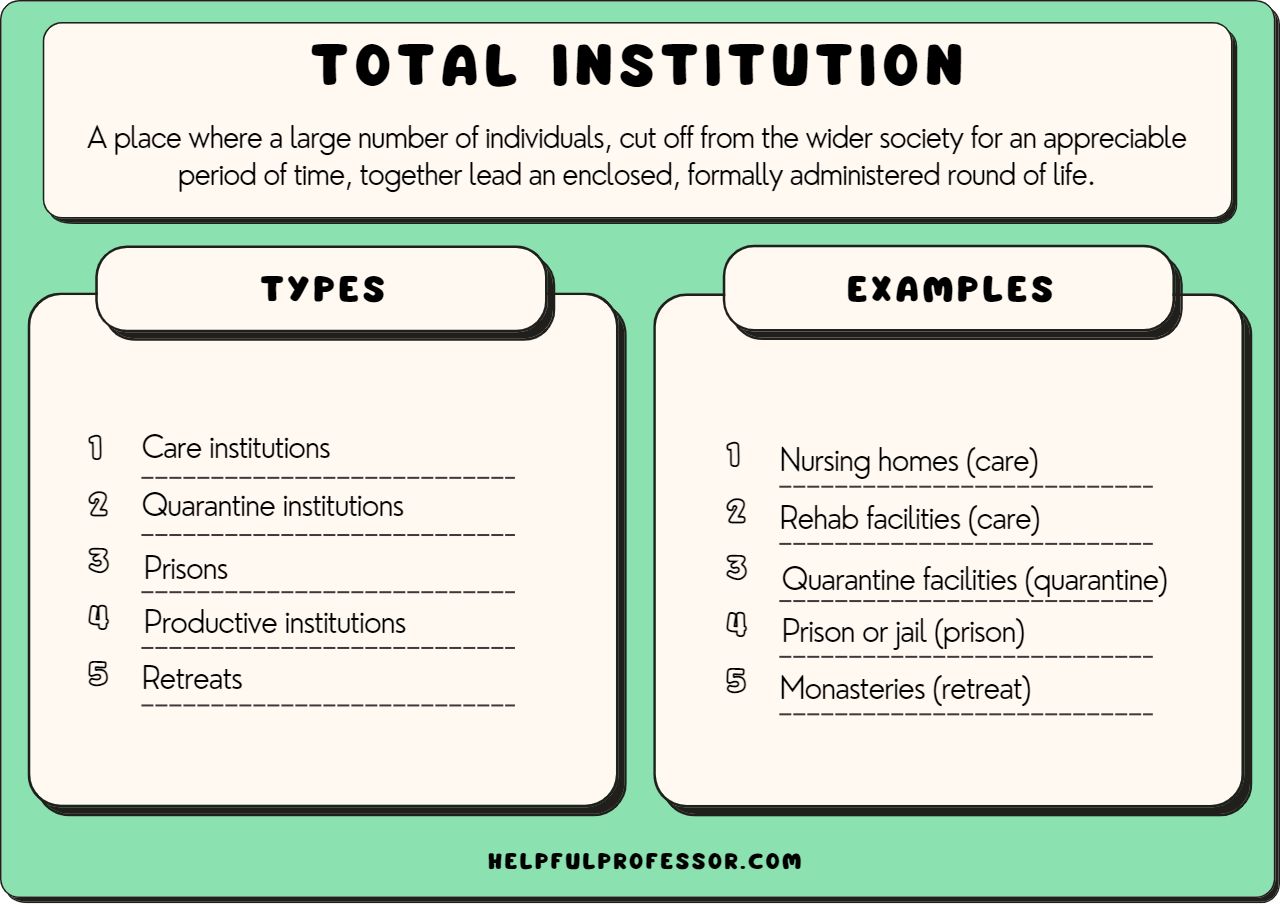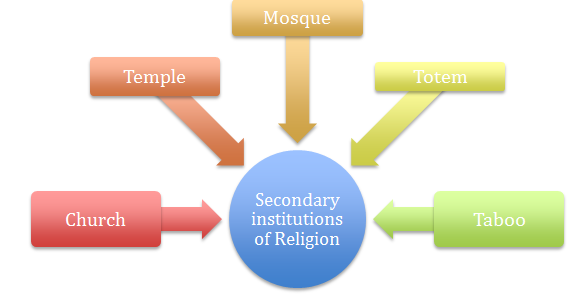Imagine a bustling city, teeming with life. Cars stream along the asphalt, a cacophony of voices fills the air, and people rush about their daily routines. What holds this complex system together? It’s not just the physical structures, but an intricate network of institutions that guide and regulate our interactions, shaping our lives and shaping the very fabric of society. These are the invisible forces of social institutions, a fascinating area of study within sociology.

Image: helpfulprofessor.com
Social institutions, the core subject of this exploration, are the established patterns of behavior and social structures that govern our lives. Think of them as the blueprints of our social world, dictating everything from how we learn and work to how we worship and raise families. These institutions are not static; they evolve over time, responding to changing societal needs and demands. Understanding their complexity and impact is crucial for making sense of the world around us and ultimately, shaping a more just and equitable society.
Defining Social Institutions: The Foundation of our Social World
For a clear picture, let’s start with a basic definition. Social institutions are the organized, patterned, and enduring sets of social practices, norms, beliefs, and values that regulate and shape human behavior. They provide a framework for social life, establishing roles, responsibilities, and expectations. Education, family, religion, government, and the economy are some prominent examples of social institutions.
The Influence of Social Institutions
Social institutions are not merely abstract concepts; they influence our lives in tangible ways. For instance, the institution of education instills knowledge, skills, and values, preparing individuals for their roles in society. Families provide emotional support, nurture, and socialization, shaping our fundamental identities. Religion offers moral guidance, a sense of purpose, and a network of shared beliefs. These institutions are interwoven, their functions often overlapping and impacting each other.
The Historical Evolution of Social Institutions
Social institutions weren’t conceived overnight. They emerged and evolved over centuries, mirroring the changing needs and challenges of society. For example, the institution of government originated to provide order and security in early human communities. As societies developed, institutions like education and healthcare arose to address the growing complexity of human needs. This evolution continues today, as societies grapple with new challenges like climate change, technological advancements, and globalization.

Image: sociologyguide.com
Key Characteristics of Social Institutions
Social institutions exhibit several key characteristics. Let’s delve deeper into these defining traits:
1. Stability and Persistence
Social institutions thrive on stability and endurance. They are not transient phenomena; they tend to persist over time, even as they adapt to changing circumstances. This stability provides a sense of order and predictability, facilitating social cohesion and smooth functioning. This stability, however, can also act as a barrier to change, leading to resistance against new ideas and social reforms.
2. Shared Values and Norms
Social institutions are built on a foundation of shared values and norms. These norms define acceptable behavior within the institution, while values provide a sense of purpose and direction. For example, the institution of education emphasizes values like knowledge, critical thinking, and innovation, while its norms dictate behavior in the classroom and the university setting. These shared norms and values maintain social order and facilitate cooperation within the institution.
3. Structured Roles and Relationships
Social institutions are defined by structured roles and relationships. Every institution has specific roles for its members, outlining individual responsibilities and expectations. These roles interact within a system of relationships, shaping interactions and influencing the flow of power within the institution. The institution of family, for instance, has roles like parents, children, siblings, and grandparents, each with their designated responsibilities and expectations.
4. Power Dynamics and Inequality
Inevitably, power dynamics and inequalities are present within social institutions. They influence who holds power, who benefits, and who gets marginalized. These power dynamics can lead to various social problems, including discrimination, exploitation, and social exclusion. Understanding how these power structures function is crucial for promoting equity and social justice within institutions.
Exploring Key Social Institutions: A Deeper Dive
We’ve established the fundamental characteristics of social institutions. Now, let’s explore some key social institutions in greater detail, examining their functions, impacts, and challenges.
The Family: The Foundation of Socialization
The institution of family is a cornerstone of society, playing a pivotal role in socialization, emotional support, and the transmission of cultural values. It provides a safe haven, teaches fundamental social skills, and shapes our sense of identity. While traditional family structures are evolving, their importance remains significant.
Education: Shaping Minds and Societies
The institution of education is crucial for individual growth and societal development. It imparts knowledge, skills, and values, preparing individuals for the workforce and active participation in society. While education promotes social mobility and empowers individuals, its accessibility and quality often vary, creating disparities in opportunities and outcomes.
Religion: Guiding Faith and Morality
Religion, a prominent social institution, offers moral guidance, a sense of community, and a framework for understanding the world. It provides rituals, beliefs, and sacred texts that shape individual behavior and provide a sense of purpose and meaning. However, religious institutions can also be sources of conflict, prejudice, and social control.
Government: Regulating Power and Order
The institution of government is responsible for maintaining order, enforcing laws, and providing public services. It establishes the legal framework for society, regulates the economy, and protects citizens’ rights. However, governments can also be subject to corruption, abuse of power, and political instability.
The Economy: Governing Production and Consumption
The institution of the economy governs the production, distribution, and consumption of goods and services. It shapes our livelihoods, creates opportunities, and drives economic growth. However, economic inequalities, market failures, and technological advancements pose challenges to equitable economic development.
Challenges and Transformations in the Modern Era
Social institutions are not static, and their functions, roles, and impacts evolve alongside societal changes. In the modern era, social institutions face significant challenges, pushing them to adapt and transform.
Globalization and Cultural Diversity
Globalization has blurred national boundaries and brought diverse cultures into closer contact, challenging the traditional values and norms of social institutions. This increased cultural diversity necessitates greater understanding, tolerance, and adaptation within institutions to address the needs of a more heterogeneous society.
Technological Advancements and Social Change
Rapid technological advancements are transforming every facet of social life, including how we communicate, work, and access information. These changes necessitate a re-evaluation of social institutions, examining how they can best adapt to the new realities of a digital age.
Environmental Concerns and Sustainability
The urgent need for environmental sustainability is challenging existing social institutions to operate with greater ecological responsibility. This requires rethinking production models, consumption patterns, and resource management within institutions like the economy and education.
Social Justice and Inequality
Social inequalities within institutions persist, fueling social unrest and challenging the very foundation of a just and equitable society. Addressing these inequalities requires fundamental reforms within institutions, ensuring fair opportunities and representation for all.
Sociology Social Institutions
https://youtube.com/watch?v=VWhDQ7FgApw
The Future of Social Institutions: Looking Ahead
Social institutions are fundamental to human society, providing structure, order, and meaning in our lives. Their effectiveness depends on their ability to adapt to changing circumstances, address social challenges, and promote justice and equity. This necessitates continuous dialogue, critical reflection, and a willingness to embrace transformative approaches to shape a more inclusive and sustainable future for all.
As you navigate the complexities of modern society, remember that the forces shaping your world extend far beyond the visible structures. The invisible architecture of social institutions plays a vital role in shaping your experiences, your opportunities, and your place in the world. By understanding their functions, challenges, and potential, you become a more informed and engaged citizen, capable of contributing to a more just and equitable society.






